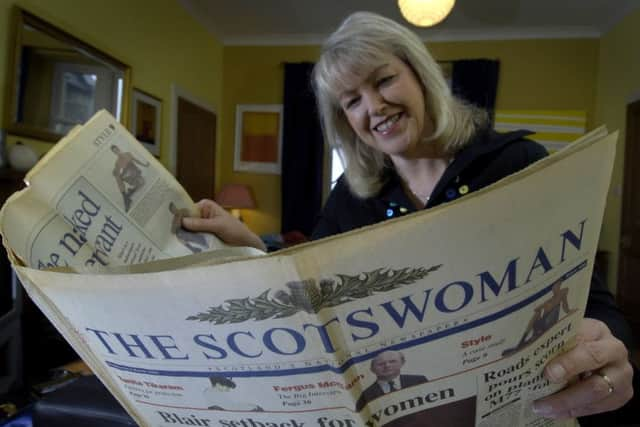Scotsman symbolically re-branded for International Women's Day


The symbolic change of name on the newspaper’s masthead will be accompanied by an editorial mix which celebrates as well as analyses the social, economic, cultural and political achievement of women.
The Scotswoman, first published in 1995, was “aimed at giving voice to a woman’s perspective, and to try to find out why so few women occupy top decision-making positions in any newspaper”.
Advertisement
Hide AdAdvertisement
Hide AdMuch has changed since then, and this newspaper has more women at the head of departments than ever before – more than half – but as revealed in a report published yesterday in our sister paper Scotland On Sunday, women in Scotland are still being paid less than their male colleagues, and the gap is growing among older workers.


This year, the theme for International Women’s Day is #pledgeforparity and the campaign aims to focus on evidence that progress to achieve equality has slowed in many places across the world, and “urgent action is needed to accelerate gender parity. Leaders across the world are pledging to take action as champions of gender parity”.
At The Scotswoman, content for tomorrow’s special edition will be decided by the women on the staff, in all sections of the newspaper.
The Scotswoman will also have contributions from the leaders of three of Scotland’s main political parties: First Minister Nicola Sturgeon, Labour leader Kezia Dugdale, and Conservative leader Ruth Davidson, all strong supporters of gender equality.
We will carry an exclusive poll which gauges Scottish opinions and attitudes to gender equality and International Women’s Day, and we will talk to a group of young women who were born when The Scotswoman was first published 21 years ago, to find out about their experiences, hopes and fears over gender equality.


But we will not focus on equality issues to the exclusion of the day’s other news, which will also be accommodated in this special edition.
Scotsman deputy editor Donald Walker said: “Gender equality remains an issue in almost every workplace in Scotland, and The Scotswoman aims to highlight the objectives of International Women’s Day and raise awareness of where Scotland stands on this issue and where we could or should be. It is an opportunity to focus minds on a matter our political parties attach great importance to, yet one where evidence suggests progress remains slow, or indeed has stalled.”
Advertisement
Hide AdAdvertisement
Hide AdTalat Yaqoob, chair and co-founder of the Women 50-50 campaign, said: “The theme for this year’s International Women’s day is ‘pledge for parity’. This is absolutely in line with the aims of Women 5050. Our democracy is incomplete without fair representation of women on public boards, in our councils and in our parliament.
“Without parity, we cannot say we have a society which is fair for the women of Scotland.
“International Women’s Day gives us an opportunity to highlight the need for, and the fight for, social justice for women, but the inequality women face exists 24 hours a day and 365 days of the year.
“This one day highlights it, but everyday should we working towards tackling it. I’m pleased to see The Scotsman focusing its publication on women and women writers. Ideally, we need to see more women commentators and more women’s opinions on matters across politics, in our papers on a daily basis.”
Emma Ritch, executive director of Engender, said: “It’s nice to see The Scotswoman returning after a 21-year hiatus, and I look forward to reading tomorrow’s paper. It’s disappointing, though, that news media coverage of women’s equality, targeted at women, should still seem like such a novelty event.”